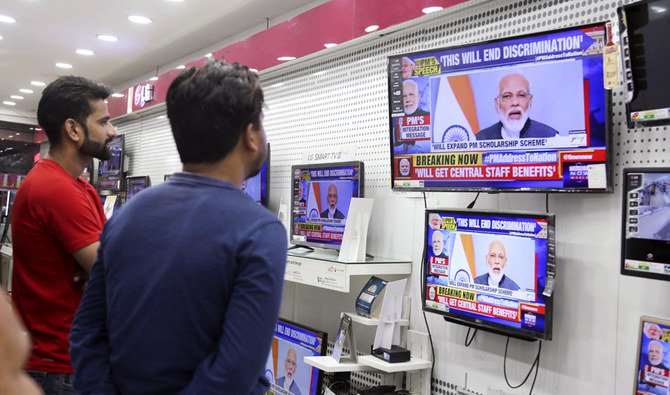Indian PM calls repeal of J&K’s Article 370 ‘historic’

Indian Prime Minister Narendra Modi called the revocation of Jammu and Kashmir’s special status a “historic decision” in a special address to the nation on Thursday.
“It is a new beginning for the people of Jammu and Kashmir. Article 370 of the constitution has not benefited the people. It has only bred militancy and separatism in the state,” said Modi in a 40-minute address.
“The new political initiatives will rid the state of militancy and extremism, and it will see a new era of development.”
Modi added that more than 42,000 people have lost their lives in Jammu and Kashmir over the last three decades.
However, his speech was not heard by people in the state, which was under curfew for the fifth consecutive day on Thursday. Telecommunication networks and basic telephone services remain unavailable to the 7 million people there.
Most of the mainstream political leaders are under house arrest, with media reports suggesting the detention of prominent activists and businessmen.
“People are angry and heartbroken,” said Shah Faesal, president of the Jammu and Kashmir People’s Movement, a new political party.
“The tragedy of Kashmir is that our lives were destroyed due to false promises and assurances from both sides of the partition. Both want the land but neither wants the people,” said Faesal, who is one the few politicians from the state to speak to the outside world after the clampdown.
“This constitutional coup has made the political mainstream irrelevant in Kashmir. Those of us who sought a resolution to the conflict within the Indian constitution are left without an argument. The extremist constituency is feeling vindicated,” he added.
Concerned that recent developments might lead to wider geopolitical instability, Faesal said: “I am worried that Pakistan and China might join forces to counter the aggressive regional posturing by India. In that battle, I fear that Kashmir will suffer.”
On Thursday, New Delhi asked Islamabad to review its decision to downgrade diplomatic ties with India.
The request follows a dramatic development on Wednesday where Pakistan recalled its envoy from New Delhi and asked the Indian ambassador in Islamabad to leave the country. It also suspended all trade and canceled the cross-border Samjhauta Express train.
In a press statement, India’s Foreign Ministry said it “regrets the steps announced by Pakistan yesterday (Wednesday) and would urge that country to review them so that normal channels for diplomatic communications are preserved.”
New Delhi blamed Pakistan for presenting “an alarming picture to the world of our bilateral ties.”
The statement said that the decision to scrap the special status was “driven by a commitment to extend to Jammu and Kashmir opportunities for development that were earlier denied by a temporary provision in the constitution. Its impact would also result in the removal of gender and socio-economic discrimination. It is also expected to result in an upswing of economic activity and improvement in the livelihood prospects of all people of Jammu and Kashmir.”
New Delhi called Pakistan’s reaction an attempt to “interfere in the sovereign matter of India,” and warned Islamabad that “an alarmist vision of the region will never succeed.”
